Afro-textured hair
.jpg)
Afro-textured hair is the natural hair texture of certain populations in Africa, the African diaspora, Australia and Asia, when this hair has not been altered by hot combs, flat irons, or chemicals (through perming, relaxation, or other straightening methods). Each strand of this hair type grows in a tiny, spring-like helix shape. The overall effect is such that, compared to straight, wavy or curly hair,[1] afro-textured hair appears denser.
Terminology
In many post-Columbian, Western societies, adjectives such as "wooly", "kinky", "nappy", or "spiralled" have frequently been used to describe natural afro-textured hair. More recently, however, it has become common in some circles to apply numerical grading systems to human hair types. There are also natural haircare products used today for unprocessed, natural hair, such as Cantu, Shea Moisture, African Pride, and Carol's Daughter products.
One popular version of these systems classifies afro-textured hair as 'type 4' (straight hair is type 1, wavy type 2, and curly is type 3, with the letters A, B, and C used to indicate the degree of coil variation within each type), with the subcategory of type 4C being most exemplary of this hair type (Walker, 1997). However, afro-textured hair is often difficult to categorize because of the many different variations among individuals. Those variations include pattern (mainly tight coils), pattern size (watch spring to chalk), density (sparse to dense), strand diameter (fine, medium, coarse), and feel (cottony, wooly, spongy).[2]
The chart below is the most commonly used chart to help determine hair types:[3]
| Type | Hair Texture | Hair Description |
|---|---|---|
| 1a | Straight (Fine) | Very soft, shiny, hard to hold a curl, hair tends to be oily, hard to damage. |
| 1b | Straight (Medium) | Has lots of body. (i.e. more volume, more full). |
| 1c | Straight (Coarse) | Hard to curl (i.e. bone straight). |
| 2a | Wavy (Fine) | Can accomplish various styles. Definite "S" pattern. Hair sticks close to the head. |
| 2b | Wavy (Medium) | A bit resistant to styling. Hair tends to be frizzy. |
| 2c | Wavy (Coarse) | Hair has thicker waves. Also resistant to styling. Hair tends to be frizzy. |
| 3a | Curly (Loose Curls) | Thick & full with lots of body. Definite "S" pattern. Hair tends to be frizzy. Can have a combination texture. |
| 3b | Curly (Tight Curls) | Medium amount of curl. Can have a combined texture. |
| 3c | Curly (Corkscrews) | Tight curls in corkscrews. The curls can be either kinky, or very tightly curled, with lots and lots of strands densely packed together. |
| 4a | Kinky (Soft) | Tightly coiled. Has a more defined curly pattern. |
| 4b | Kinky (Wiry) | Tightly coiled. Less defined curly pattern. Has more of a "Z"-shaped pattern. |
| 4c | Kinky (Wiry) | Tightly coiled. Almost no defined curl pattern. Has more of a "Z"-shaped pattern.[4] |
Structure
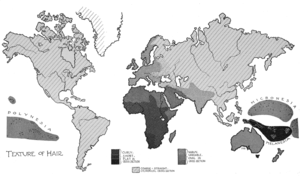
Different ethnic groups have observable differences in the structure, density, and growth rate of hair. With regard to structure, all human hair has the same basic chemical composition in terms of keratin protein content.[5] Franbourg et al. have found that Black hair may differ in the distribution of lipids throughout the hair shaft.[5] Classical afro-textured hair has been found to be not as densely concentrated on the scalp as other follical types.[1] Specifically, the average density of afro-textured hair was found to be approximately 190 hairs per square centimeter. This was significantly lower than that of Caucasian hair, which, on average, has approximately 227 hairs per square centimeter.[1]
Loussourarn found that afro-textured hair grows at an average rate of approximately 256 micrometers per day, whereas Caucasian hair grows at approximately 396 micrometers per day.[1][6] In addition, due to a phenomenon called 'shrinkage', afro-textured hair that is a given length when stretched straight can appear much shorter when allowed to naturally coil.[7] Shrinkage is most evident when afro-hair is (or has recently been) wet. The more coiled the hair texture, the higher the shrinkage.
An individual hair's shape is never completely circular. The cross-section of a hair is an ellipse, which can tend towards a circle or be distinctly flattened. Asiatic heads of straight hair are formed from almost-round hairs, and Caucasian hair's cross sections form oval shapes. Afro-textured hair has a flattened cross-section and is finer, and its ringlets can form tight circles with diameters of only a few millimeters. In humans worldwide, Asiatic hair is the most common, whereas afro-textured hair is the least common. This is because the former hair texture is typical of the large populations inhabiting East Asia as well as the indigenous peoples of the Americas.[8]
Afro-textured hair strands can possess "torsion twists", where the hair strand turns around itself. These torsion twists may prevent the hair strands from coiling into tight curls, instead separating them and allowing the hair as a whole to have a fluffier, more undefined look.[9]
Evolution
.jpg)
Clarence (2012) suggests that afro-textured hair may have initially evolved because of an adaptive need amongst humans' early hominid ancestors for protection against the intense UV radiation of the sun in Africa.[10] With regard to the hypothesized recent African origin of modern humans, the author argues that afro-textured hair was the original hair texture of all modern humans prior to the "Out-of-Africa" migration that populated the rest of the globe.[10] According to Clarence (2012), afro-textured hair may have been adaptive for the earliest modern humans in Africa because the relatively sparse density of such hair, combined with its elastic helix shape, results in an airy effect. The resulting increased circulation of cool air onto the scalp may have thus served to facilitate the body-temperature-regulation system of hominids while they lived on the open savannah.[10] Afro-hair requires more moisture than straight hair and tends to shrink when dry. Instead of sticking to the neck and scalp when damp (as do straighter textures), unless completely drenched it tends to retain its basic springiness. The trait may have been retained and/or preferred among many anatomically modern populations in equatorial areas, such as Polynesians, Micronesians, Melanesians, Australoids and the Negrito, because of its contribution to enhanced comfort levels under tropical climate conditions.[10]
History
Continental Africa
Historically, sub-Saharan Africans, as in every culture, developed hairstyles that defined status, or identity, in regards to age, ethnicity, wealth, social rank, marital status, religion, fertility, adulthood, and death. Hair was carefully groomed by those who understood the aesthetic standard, as the social implications of hair grooming were a significant part of community life. Dense, thick, clean, and neatly groomed hair was something highly admired and sought after. Hair groomers possessed unique styling skills, allowing them to create a variety of designs that met the local cultural standards. Hair was usually dressed according to local culture.
In many traditional cultures, communal grooming was a social event when a woman could socialize and strengthen bonds between herself, other women and their families. Historically, hair braiding was not a paid trade. Since the African diaspora, in the 20th and 21st centuries it has developed as a multimillion-dollar business in such regions as the United States and western Europe. An individual's hair groomer was usually someone whom they knew closely. Sessions can include shampooing, oiling, combing, braiding, and twisting, plus adding accessories.
For shampooing, black soap was widely used in nations in West and Central Africa. Additionally, palm oil and palm kernel oil were popularly used for oiling the scalp. Shea butter has traditionally been used to moisturize and dress the hair.
-
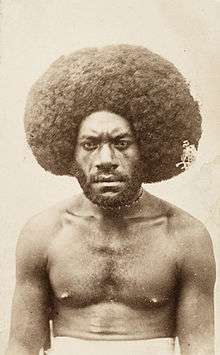
Fijian chieftain (Tui Namosi) with natural afro-textured hair worn in an Afro, circa 1865.
-

Himba girl with styled afro-textured hair.
-
.jpg)
Juvénal Habyarimana, former president of Rwanda (1980).
United States
Trans-Atlantic slave trade
Diasporic Africans in the Americas have been experimenting with ways to style their hair since their arrival in the Western Hemisphere well before the 19th century. During the approximately 400 years of the Trans-Atlantic slave trade, which extracted over 20 million people from West and Central Africa, their beauty ideals have undergone numerous changes.
Africans captured as slaves no longer had the sort of resources to practice hair grooming that they had had when home. Slaves adapted, finding sheep-fleece carding tools useful for detangling their hair. They suffered from scalp diseases and infestations due to their deplorable living conditions. Slaves used varying remedies for disinfecting and cleansing their scalps, such as applying kerosene or cornmeal directly on the scalp with a cloth as they carefully parted the hair. For field work, male slaves shaved their hair and wore hats to protect their scalps against the sun. House slaves had to appear tidy and well-groomed. The men sometimes wore wigs mimicking their masters', or similar hairstyles, while the women typically plaited or braided their hair. During the 19th century, hair styling, especially among women, became more popular. Cooking grease such as lard, butter and goose grease, were used to moisturize the hair. Female slaves sometimes used hot butterknives to curl their hair.[11]
Because of the then-prevalent notion that straight hair was more acceptable than kinky hair, many black people began exploring solutions for straightening, or relaxing, their tresses. One post-slavery solution was a mixture of lye, egg and potato, which burned the scalp upon contact.
Politics of Black hair
In the 1960s, natural afro-textured hair was transformed from a simple expression of style into a revolutionary political statement. It became a fundamental tool of the Black movement in America, and "[h]air came to symbolize either a continued move toward integration in the American political system or a growing cry for Black power and nationalism."[12]:51 Prior to this, the idealized Black person (especially Black women) "had many Eurocentric features, including hairstyles."[12]:29 However, during the movement, the Black community endeavoured to define their own ideals and beauty standards, and hair became a central icon which was "promoted as a way of challenging mainstream standards regarding hair."[13] :35 During this time, afro-textured hair "was at its height of politicization," and wearing an Afro was an easily distinguishable physical expression of Black pride and the rejection of societal norms.[13]:43 Jesse Jackson, a political activist and well-known cultural icon, says that "the way [he] wore [his] hair was an expression of the rebellion of the time".[12]:55 Black activists infused straightened hair with political valence; straightening one's hair in an attempt to 'simulate Whiteness', whether chemically or with the use of heat, came to be seen by some as an act of self-hatred and a sign of internalized oppression imposed by White-dominated mainstream media.
At this time, an African-American person's "ability to conform to mainstream standards of beauty [was] tied to being successful."[12]:148 Thus, rejecting straightened hair symbolized a deeper act of rejecting the belief that straightening hair and other forms of grooming which were deemed 'socially acceptable' were the only means of looking presentable and attaining success in society. The pressing comb and chemical straighteners became stigmatized within the community as symbols of oppression and imposed White beauty ideals. Certain Black people sought to embrace beauty and affirm and accept their natural physical traits. One of the ultimate goals of the Black movement was to evolve to a level where Black people "were proud of black skin and kinky or nappy hair. As a result, natural hair became a symbol of that pride."[12]:43 Negative perceptions of afro-textured hair and beauty had been passed down through the generations, so they had become ingrained in Black mentality to the point where they had been accepted as simple truths. Wearing natural hair was seen as a progressive statement, and for all the support that the movement gathered, there were many who opposed natural hair both for its aesthetics and the ideology that it promoted. It caused tensions between the Black and White communities, as well as discomfort amongst more conservative African-Americans.
The style of afro-textured hair continues to be politicized in contemporary society. "These issues of style are highly charged as sensitive questions about [an individual's] very 'identity'."[14]:34 Whether an individual decides to wear their hair in its natural state or alter it, all Black hairstyles convey a message. In several post-colonial societies, the value system promotes 'white bias', and "ethnicities are valorized according to the tilt of whiteness — [which] functions as the ideological basis for status ascription."[14]:36 In turn, in this value system, "African elements — be they cultural or physical — are devalued as indices of low social status, while European elements are positively valorized as attributes enabling individual upward mobility".[15]:36 This value system is reinforced by the systematic racism that was, and still is, often hidden from the public eye in Western society. Racism 'works' by encouraging the devaluation of self-identity by the victims themselves, and that re-centering of a sense of pride is a prerequisite for a politics of resistance and reconstruction.[14]:36
In this system, "hair functions as a key 'ethnic signifier' because, compared with bodily shape or facial features, it can be changed more easily by cultural practices such as straightening."[14]:36 Racism originally "'politicized' [afro-textured] hair by burdening it with a range of negative social and psychological 'meanings'" — categorizing it as a problem.[14]:37 Ethnic difference that could be easily manipulated, like hair, was altered in order for ethnic minorities to assimilate into a dominant, Eurocentric society. Natural hairstyles, such as the Afro and dreadlocks, "counter-politicized the signifier of ethnic devalorization, redefining Blackness as a positive attribute".[14] By wearing their hair as it naturally grows, individuals with afro-textured hair were taking back agency in deciding the value and politics of their own hair. Wearing one's hair naturally also opens up a new debate: Are those who decide to still wear their hair straightened, for example, less 'Black' or 'proud' of their heritage, than those who decide to wear their hair naturally? This debate is an often-ongoing topic of discussion within the community. The issue is highly debated and disputed, creating almost a social divide within the community — between those who decide to be natural and those who do not.
Emancipation and post-Civil War
After the American Civil War and emancipation, many African-Americans migrated to larger towns or cities, where they were influenced by new styles. The photos below show 19th-century women leaders with a variety of styles with natural hair. Others straightened their hair to conform to White beauty ideals. They wanted to succeed, and to avoid mistreatment including legal and social discrimination. Some women, and a smaller number of men, lightened their hair with household bleach. A variety of caustic products that contained bleaches, including laundry bleach, designed to be applied to afro-textured hair, were developed in the late 19th and early 20th centuries, as African Americans demanded more fashion options. They used creams and lotions, combined with hot irons, to straighten their hair.
The Black hair care industry was initially dominated by White-owned businesses. In the late 19th century, African-American entrepreneurs such as Annie Turnbo Malone, Madam C. J. Walker, Madam Gold S.M. Young, Sara Spencer Washington and Garrett Augustus Morgan revolutionized hair care by inventing and marketing chemical (and heat-based) applications to alter the natural tightly curled texture. They rapidly became successful and dominated the Black hair care market. In 1898, Anthony Overton founded a hair care company that offered saponified coconut shampoo and AIDA hair pomade. Men began using pomades, among other products, to achieve the standard aesthetic look.
During the 1930s, conking (vividly described in The Autobiography of Malcolm X) became an innovative method in the U.S. for Black men to straighten their kinky hair. Women at that time tended either to wear wigs, or to hot-comb their hair (rather than conk it) in order to temporarily mimic a straight style without permanently altering the natural curl pattern. Popular until the 1960s, the conk hair style was achieved through the application of a painful lye, egg and potato mixture that was toxic and immediately burned the scalp.
Black-owned businesses in the hair-care industry provided jobs for thousands of African-Americans. These business owners gave back strongly to the African-American community. During this time, hundreds of African-Americans became owner-operators of successful beauty salons and barbershops. These offered permanents and hair-straightening, as well as cutting and styling services, some to both White and Black clients. In this era, men regularly went to barber shops to have their beards groomed, and some Black barbers developed exclusively White, elite clientele, sometimes in association with hotels or clubs. Media images tended to perpetuate the ideals of European beauty of the majority culture, even when featuring African-Americans.
African-Americans began sponsoring their own beauty events. The winners, many of whom wore straight hair styles and some of whom were of mixed race, adorned Black magazines and product advertisements. In the early 20th century, media portrayal of traditional African hair styles, such as braids and cornrows, was associated with African-Americans who were poor and lived in rural areas. In the early decades of the Great Migration, when millions of African Americans left the South for opportunities in northern and midwestern industrial cities, many African Americans wanted to leave this rural association behind.[16]
-

African-American woman wearing styled textured hair. Photo taken c. 1850.
-

Civil rights activist and suffragist Ida B. Wells in styled natural hair. Photo taken between 1870 and 1897.
-

Successful entrepreneur Madam C. J. Walker invented a method that relaxed textured hair. Photo taken c. 1914.
-

A young African-American woman wearing styled textured hair. Photo taken between 1885 and 1910.
-

Photo of African-American children taken between 1885 and 1910.
-

African-American children with braided styles in Natchitoches, Louisiana, 1940.
-

Jazz musician Eddie South sporting a conk, or congolene hairstyle, 1946.
-
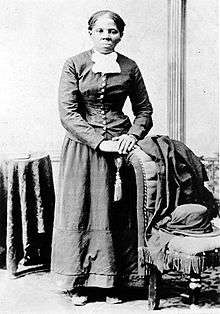
19th-century African-American abolitionist Harriet Tubman with styled afro-textured hair.
-

African-American woman with Afro hairstyle, c. 1880.
-

African-American woman in New Orleans in 1860 with styled afro-textured hair.
-
Fats Domino with natural afro-textured hair.
Scholars debate whether hair-straightening practices arose out of Black desires to conform to a Eurocentric standard of beauty, or as part of their individual experiments with fashions and changing styles. Some believe that slaves and later African-Americans absorbed prejudices of the European slaveholders and colonizers, who considered most slaves as second-class, as they were not citizens. Ayana Byrd and Lori Tharp say that they believe the preference for Eurocentric ideas of beauty still pervades the Western world.[17]
Rise of Black pride
African-American hair has been through many different cycles. Slavery played a major role in the ups and downs of the pride that African-Americans take in their hair. "Everything I knew about American history I learned from looking at Black people's hair. It's the perfect metaphor for the African experiment here: the price of the ticket (for a journey no one elected to take), the toll of slavery, and the costs remaining. It's all in the hair. Like Jamaica Kincaid, who writes only about a character named Mother, I've decided to write only about hair: what we do to it, how we do it, and why. I figure this is enough," said Lisa Jones in an essay titled Hair Always and Forever.[18]
Cheryl Thompson writes, "In 15th-century Africa, hairstyles were used to indicate a person's marital status, age, religion, ethnic identity, wealth and rank within the community (see Byrd & Tharps, 2001; Jacobs-Huey, 2006; Mercer, 1994; Patton, 2006; Rooks, 1996).[19] For young black girls, Thompson says, "hair is not just something to play with" – it is something that sends a message, not only to the outside public but also a message on how they see themselves.[19] "In the 1800s and early 1900s, nappy, kinky, curly hair was deemed inferior, ugly and unkempt in comparison to the flowing, bouncy hair of people from other cultures," says Marcia Wade Talbert in Black Enterprise.[20] Chemical relaxers increased in demand throughout the 1800s and 1900s. These relaxers often contained sodium hydroxide (lye) or guanidine hydroxide which result in hair breakage, thinning of the hair, slowing of hair growth, scalp damage and even hair loss, according to Gheni Platenurg in the article, "Black Women Returning to Their Natural Hair Roots."[21]
In the United States, the successes of the civil rights movement, and the Black power and Black pride movements of the 1960s and 1970s, inspired African-Americans to express their political commitments by adopting more traditionally African styles. The Afro hairstyle developed as an affirmation of Black African heritage, expressed by the phrase, "Black is beautiful." Angela Davis wore her Afro as a political statement and started a movement toward natural hair. This movement influenced a generation, including celebrities like Diana Ross, whose Jheri curls took over the 1980s.
-

Civil rights activist Angela Davis wearing an Afro in 1973.
-
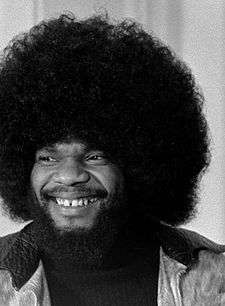
African-American musician Billy Preston in 1974.
-
Movie screenshot of actor Richard Lawson in Black Fist (1975).
-
African-American guitarist Johnny "Guitar" Watson in 1977.
-

African-American woman with short Afro in 1979.
-
African-American country music singer Charley Pride in 1981.
Since the late 20th century, Black people have experimented with a variety of styles, including cornrows, locks, braiding, hair twists and short, cropped hair, specifically designed for afro-textured hair. Natural hair blogs include Black Girl Long Hair (BGLH), Curly Nikki and Afro Hair Club. With the emergence of hip-hop culture and Jamaican influences like reggae music, more non-Black people have begun to wear these hairstyles as well. A new market has developed in such hair products as "Out of Africa" shampoo.
The popularity of natural hair has waxed and waned. In the early 21st century, a significant percentage of African-American women still straighten their hair with relaxers of some kind (either heat- or chemical-based). This is done despite the fact that prolonged application of such chemicals (or heat) can result in overprocessing, breakage and thinning of the hair. (Similarly, many women of European or Asian ancestry use equivalent products to curl their naturally straight hair.)
Natural hairstyles came back with Erykah Badu's movement in 2005, with Afros and twists, and started trending again. Sales of relaxers took a great fall among African-American women from 2010 to 2015. Many African-American women gave up relaxers to go back to their natural roots. Celebrities like Esperanza Spalding, Janelle Monáe and Solange Knowles have played with natural hair looks. During the same time period, the number of natural-hair support groups has increased. "I see a lot of women who have started to accept themselves and their hair".[22] "They're encouraging their children to start accepting themselves. This is entirely new," according to Terry Shrosphire in the article "Black Hair Relaxer Sales are Slumping Because Of This".[22] Research has shown that relaxer sales dropped from $206 million in 2008 to $156 million in 2013. Meanwhile, sales of products for styling natural hair continued to rise. Chris Rock's documentary Good Hair has shown what many women go through to achieve the "European standard" of hair. "Weaves that cost thousands of dollars and relaxers that take way too much time. Black woman has finally decided that it was simply too much," according to the documentary.[23]
Modern perceptions and controversies
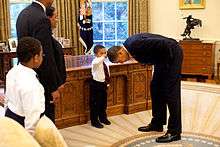
In 1971 Melba Tolliver, a WABC-TV correspondent, made national headlines when she wore an Afro while covering the wedding of Tricia Nixon Cox, daughter of President Richard Nixon. The station threatened to take Tolliver off the air until the story caught national attention.[27]
In 1981 Dorothy Reed, a reporter for KGO-TV, the ABC affiliate in San Francisco, was suspended for wearing her hair in cornrows with beads on the ends. KGO called her hairstyle "inappropriate and distracting". After two weeks of a public dispute, an NAACP demonstration outside of the station, and negotiations, Reed and the station reached an agreement. The company paid her lost salary, and she removed the colored beads. She returned to the air, still braided, but beadless.[28]
A 1998 incident became national news when Ruth Ann Sherman, a young White teacher in Bushwick, Brooklyn, introduced her students to the 1998 book Nappy Hair by African-American author Carolivia Herron. Sherman was criticized by some in the community, who thought that the book presented a negative stereotype (although it won three awards), but she was supported by most parents of her students.[29]
On April 4, 2007, radio talk-show host Don Imus referred to the Rutgers University women's basketball team, who were playing in the Women's NCAA Championship game, as a group of "nappy-headed hos" during his Imus in the Morning show. Imus's producer Bernard McGuirk compared the game to "the jigaboos versus the wannabes," alluding to Spike Lee's film School Daze. Imus apologized two days later, after receiving widespread criticism. CBS Radio canceled Don Imus's morning show a week after the incident on April 12, 2007, firing both Imus and McGuirk.
During August 2007, The American Lawyer magazine reported that an unnamed junior Glamour Magazine staffer gave a presentation on the "Do's and Don'ts of Corporate Fashion" for Cleary Gottlieb, a New York City law firm. Her slide show included her negative comments about Black women wearing natural hairstyles in the workplace, calling them "shocking," "inappropriate," and "political." Both the law firm and Glamour Magazine issued apologies to the staff.[30][31]
In 2009, Chris Rock produced Good Hair, a documentary film which addresses a number of issues pertaining to African-American hair. He explores the styling industry, the variety of styles now acceptable in society for African-American women's hair, and the relations of these to African-American culture.
The Kenyan model Ajuma Nasenyana has criticized a trend in her native Kenya that rejects the indigenous Black African physical standards of beauty in favour of those of other communities. In a 2012 interview with the Kenyan broadsheet the Daily Nation, she said,
"[I]t seems that the world is conspiring in preaching that there is something wrong with Kenyan ladies' kinky hair and dark skin[...] Their leaflets are all about skin lightening, and they seem to be doing good business in Kenya. It just shocks me. It's not OK for a Caucasian to tell us to lighten our skin[...] I have never attempted to change my skin. I am natural. People in Europe and America love my dark skin. But here in Kenya, in my home country, some consider it not attractive."[32]
In November 2012, the American actress Jada Pinkett Smith defended her daughter Willow's hair on Facebook after the girl was criticized for an "unkempt" look. "Even little girls should not be a slave to the preconceived ideas of what a culture believes a little girl should be," the actress said.[33]
In 2014, People Magazine named actress Lupita Nyong'o as their "Most Beautiful". Her short, natural hair is a signature trademark, and the wide recognition of her as a beauty and style icon is a notable moment in popular culture.
In other diasporic Black populations
-

Man with dreadlocks.
-

Man with dreadlocks.
-

Afro-Peruvian Rastafarian.
-

Toni Morrison, Nobel Prize-winning American author, with dreadlocks.
During the 19th century, throughout the West Indies, the teachings of Jamaican political leader Marcus Garvey encouraged an active rejection of European standards of beauty. The resulting Rastafari movement of the 20th century has maintained that the growth of freeform dreadlocks is related to spiritual enlightenment, largely informed by the Biblical Nazirite oath. The Rastafari movement has been so influential in the visibility and subsequent popularity of dreadlocks, throughout the Caribbean and in the global African diaspora, that the term "rasta" has become synonymous with a dreadlocked individual. Today, dreadlocks are common among Afro-Caribbeans and Afro-Latin Americans.
Styling
The care and styling of natural Black hair has become an enormous industry in the United States. Numerous salons and beauty supply stores cater solely to clients with natural afro-textured hair.
The Afro is a large, often spherical growth of afro-textured hair that became popular during the Black power movement. The Afro has a number of variants including "Afro-puffs" (a cross between an Afro and pigtails) and a variant in which the Afro is treated with a blow dryer to become a flowing mane. The "hi-top fade" was common among African-American men and boys in the 1980s and has since been replaced in popularity by the 360 waves and the Caesar haircut.
Other styles include plaits or braids, the two-strand twist, and basic twists, all of which can form into manicured dreadlocks if the hair is allowed to knit together in the style-pattern. Basic twists include finger-coils and comb-coil twists. Dreadlocks, also called "dreads," "locks" or "locs," can also be formed by allowing the hairs to weave together on their own from an Afro. Another option is the trademarked "Sisterlocks" method, which produces what could be called very neat micro-dreadlocks.[34]
Manicured locks — alternatively called salon locks or fashion locks — have numerous styling options that include strategic parting, sectioning and patterning of the dreads. Popular dreadlocked styles include cornrows, the braid-out style or "lock crinkles", the basket weave and pipe-cleaner curls. Others include a variety of dreaded mohawks or lock-hawks, a variety of braided buns, and combinations of basic style elements.
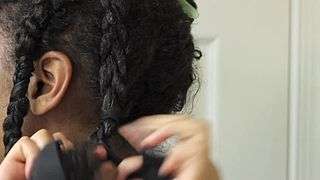
Natural hair can also be styled into "bantu knots", which involves sectioning the hair with square or triangular parts and fastening it into tight buns or knots on the head. Bantu knots can be made from either loose natural hair or dreadlocks.[35] When braided flat against the scalp, natural hair can be worn as basic cornrows or form a countless variety of artistic patterns.
Other styles include the "natural" (also known as a "mini-fro" or "teenie weenie Afro") and "microcoils" for close-cropped hair, the twist-out and braid-out (in which hair is trained in twists or braids before being unravelled), "Brotherlocks" and "Sisterlocks," the fade, and any combination of styles such as cornrows and Afro-puffs.
A majority of Black hairstyles involve parting the natural hair into individual sections before styling.[36] Research shows that excessive braiding, tight cornrows, relaxing, and vigorous dry-combing of afro-textured hair can be harmful to the hair and scalp. They have also been known to cause ailments such as alopecia, balding at the edges of the scalp, excessive dry scalp, and bruises on the scalp. Keeping hair moisturized, trimming ends, and using very little to no heat will prevent breakage and split ends.
-

Nigerian football player Isah Eliakwu.
-

Grammy-Award winning American artist India.Arie, also known for singing about afro-textured hair in her award-winning song "I Am Not My Hair".
-
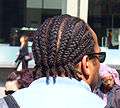
Modern Black man wearing cornrows.
-
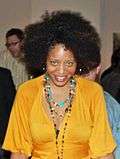
Dancer at the Tribeca Film Festival.
-
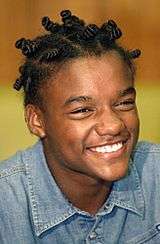
Afro-Brazilian actor Darlan Cunha
-
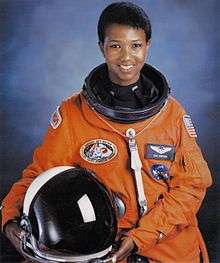
Mae Jemison, American physician and NASA astronaut, wearing a short natural Afro.
-
.jpg)
Brazilian singer and professional dancer Luciana Mello.
-

Afro-Colombian children.
-
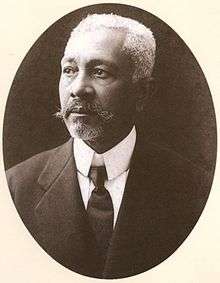
Brazilian Teodoro Fernandes Sampaio.
-

American woman.
-

Lead singer Lisa Kekaula of the rock band The Bellrays.
-

Swedish artist Ayesha Quraishi.
-

Afro-Brazilian politician Luiza Helena de Bairros.
-
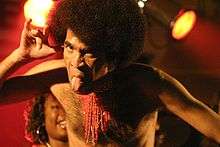
Boney M performer Bobby Farrell, 2006.
-

Afro-Brazilian singer Larissa Luz.
-

Singer Lenny Kravitz.
-
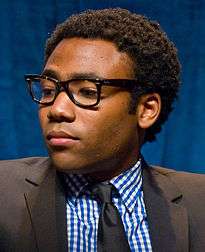
Actor/musician Donald Glover.
-
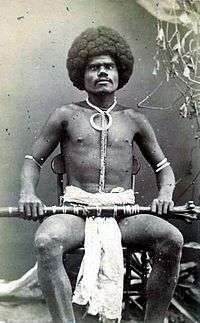
A Fijian (Melanesian) mountain warrior.
See also
Notes
- 1 2 3 4 Loussouarn G (August 2001). "African hair growth parameters". Br. J. Dermatol. 145 (2): 294–7. doi:10.1046/j.1365-2133.2001.04350.x. PMID 11531795.
- ↑ Naanis, Naturals. "LOIS Hair System: What Type of African/Black Hair Do You Have?". From Grandma's Kitchen. Retrieved 2008-01-18.
- ↑ Allen, Marquella. "What's Your Hair Type". Archived from the original on 2014-02-22. Retrieved 2014-02-12.
- ↑ "Type 4 — Coily Hair". naturallycurly.com. 2014. Retrieved 12 July 2014.
- 1 2 Franbourg; et al. (2007). "Influence of Ethnic Origin of Hair on Water-Keratin Interaction". In Enzo Berardesca; Jean-Luc Lévêque; Howard I. Maibach. Ethnic Skin and Hair. New York: Informa Healthcare. p. 101. ISBN 978-0-8493-3088-9. OCLC 70218017.
- ↑ Khumalo NP, Gumedze F (September 2007). "African hair length in a school population: a clue to disease pathogenesis?". Journal of Cosmetic Dermatology. 6 (3): 144–51. doi:10.1111/j.1473-2165.2007.00326.x. PMID 17760690.
- ↑ "Shrinkage In Natural Curly Black Hair — How To Work With It". Blackhairinformation.com. 2010-02-14. Retrieved 2012-06-20.
- ↑ "Hair Science". Hair Science. 2005-02-01. Retrieved 2012-06-20.
- ↑ Jc. "The Natural Haven". Thenaturalhaven.blogspot.com. Retrieved 2012-06-20.
- 1 2 3 4 Clarence R. Robbins, Chemical, Weird and Physical Behavior of Human Hair (2012), p. 181, ISBN 3642256112
- ↑ Hargro, Brina. "Hair Matters: African American Women and the Natural Hair Aesthetic". ScholarWorks @ Georgia State University. Georgia State University. Retrieved 2015-06-07.
- 1 2 3 4 5 Tharps, Lori; Byrd, Ayana (Jan 12, 2002). Hair Story: Untangling the Roots of Black Hair in America. New York: St. Martin's Griffin.
- 1 2 Banks, Ingrid (Oct 1, 2000). Hair Matters: Beauty, Power, and Black Women's Consciousness. New York: NYU Press.
- 1 2 3 4 5 6 Mercer, Kobena. "Black hair/style politics." New Formations 3. Winter (1987).
- ↑ Mercer, Kobena. "Black hair/style politics." New Formations 3. Winter (1987): 33–56.
- ↑ Victoria Sherrow (2006). Encyclopedia of Hair: A Cultural History. Greenwood Publishing Group. ISBN 978-0-313-33145-9. Retrieved 2011-05-22.
- ↑ Byrd, Ayana D.; Tharps, Lori L. (2001). Hair Story: Untangling the Roots of Black Hair in America. St. Martin's Press. ISBN 0-312-28322-9.
- ↑ Johnson, Dianne "'She's grown dreadlocks': the fiction of Angela Johnson. (Children's Literature)". World Literature Today. 14 September 2004.
- 1 2 Thompson, Cheryl "Black Women and Identity: What's Hair Got to do with it?", Michigan Feminist Studies, vol. 22, no. 1, Fall 2008-2009
- ↑ Marcia Wade Talbert, "Natural Hair and Professionalism", Black Enterprise. 22. February 2011
- ↑ Platenburg, Gheni "Black Women Returning to Their Natural Roots" Victoria Advocate (TX) 3 March 2011. 10 April 2015.
- 1 2 Shropshire, Terry "Black Hair Relaxer Sales are Slumping Because Of This" 3 April 2015. 10 April 2015. http://chicagodefender.com.
- ↑ Rock, Chris Good Hair Produced by Chris Rock Productions and HBO Films. 10 April 2015.
- ↑ "Boy who touched Obama's hair: Story behind White House photo is probably in your inbox" | The Cutline — Yahoo! News
- ↑ Calmes, Jackie (2012-05-23). "Indelible Image of a Boy's Pat on Obama's Head Hangs in White House". The New York Times. nytimes.com. Retrieved 2014-04-12.
- ↑ Jones, Jonathan (2012-05-25). "Barack Obama bows to the significance of his ethnicity". The Guardian. London.
- ↑ Douglas, William (Oct 9, 2009). "For Many Black Women, Hair Tells the Story of Their Roots". Retrieved Dec 29, 2009.
- ↑ "1981: Television reporter Dorothy Reed is suspended for wearing her hair in cornrows". Retrieved Dec 29, 2009.
- ↑ Leyden, Liz (1998-12-03). "N.Y. Teacher Runs Into a Racial Divide". Washington Post. Retrieved 2008-06-05.
- ↑ Moe (2007-08-14). "'Glamour' Editor To Lady Lawyers: Being Black Is Kinda A Corporate 'Don't'". Jezebel. Gawker Media. Retrieved 2008-06-05.
- ↑ Kym Platt (2007-09-07). "Glamour Apologizes". Ask This Black Woman. Archived from the original on 2008-04-17. Retrieved 2008-06-05.
- ↑ Danielle, Britni. "Kenyan model Ajuma Nasenyana fights skin lightening and European standards of beauty". Clutch Magazine. Retrieved 3 July 2012.
- ↑ Johnson, Craig (November 28, 2012). "Jada blasts Willow hair critics: It's her choice". HLN TV. Turner Broadcasting. Retrieved February 8, 2013.
- ↑ Irons, Meghan (January 6, 2008). "Black women find freedom with new 'do". Boston Globe. Retrieved February 8, 2013.
- ↑ "The Bantu Knots Hairstyle: A Beautiful Controversy". www.curlcentric.com.
- ↑ "Braiding 'can lead to hair loss'". BBC News. 2007-08-24.
References
- Bundles, A'Lelia Perry (2001). On her own ground: the life and times of Madam C. J. Walker. New York: Scribner. ISBN 978-0-684-82582-3. OCLC 44548979.
- Chaubey G, Metspalu M, Kivisild T, Villems R (January 2007). "Peopling of South Asia: investigating the caste-tribe continuum in India". BioEssays. 29 (1): 91–100. doi:10.1002/bies.20525. PMID 17187379.
- Craig, Maxine Leeds (2002). Ain't I a Beauty Queen?: Black Women, Beauty, and the Politics of Race. Oxford: Oxford University Press. ISBN 978-0-19-514267-9. OCLC 47995928.
- Interview by Dr. Victoria Holloway-Barbosa from the documentary on Black hair, My Nappy Roots: A Journey Through Black Hair-itage.
- Martin, Crystal (Mar 31, 2006). "SoftSheen Sponsors Hair Flick" (PDF). WWD. p. 10.
- Kivisild T, Rootsi S, Metspalu M, et al. (February 2003). "The Genetic Heritage of the Earliest Settlers Persists Both in Indian Tribal and Caste Populations". American Journal of Human Genetics. 72 (2): 313–32. doi:10.1086/346068. PMC 379225
 . PMID 12536373.
. PMID 12536373. - Quintana-Murci L, Chaix R, Wells RS, et al. (May 2004). "Where West Meets East: The Complex mtDNA Landscape of the Southwest and Central Asian Corridor". American Journal of Human Genetics. 74 (5): 827–45. doi:10.1086/383236. PMC 1181978
 . PMID 15077202.
. PMID 15077202. - Tishkoff SA, Dietzsch E, Speed W, et al. (March 1996). "Global patterns of linkage disequilibrium at the CD4 locus and modern human origins". Science. 271 (5254): 1380–7. doi:10.1126/science.271.5254.1380. PMID 8596909.
- Walker, A (1997) Andre Talks Hair Simon and Schuster, NY
External links
| Look up coil, curly, frizzy, kink, or nappy in Wiktionary, the free dictionary. |
| Wikimedia Commons has media related to Afro-textured hair. |
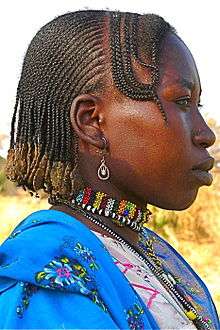
.jpg)
